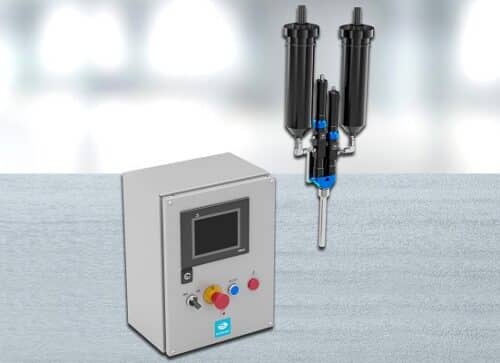Dosing very small quantities is often required for potting electronic components as well as for bonding and sealing applications. Meter Mix has designed the LiquidFlow 2 specifically for these requirements. The compact metering and mixing system is configured for either manual or robotic application of two-component polyurethane, epoxy resin, silicone and methacrylate.
The LiquidFlow 2 is configured with twin progressive cavity pumps, which can be manufactured from different materials. Therefore, the system can be utilised for processing abrasive and/or corrosive materials. The pumps operate without pulsation. Very small beads and shots can be applied continuously and precisely. The mixing ratio is variably adjustable. Quantities from 0.006 millilitres can be dispensed. The accuracy is typically within ± 1 percent. The materials can be supplied from various containers, with the standard being 600 ml cartridges. Optional reservoirs are available in 2.5 and 6 litre sizes. Digitally controlled heating circuits, electric material agitators and electronic fill level
indicators are also available.

High flexibility in everyday production
Users benefit from high economic efficiency whilst operation is virtually silent. The machine operation is user-friendly and takes place via an integrated PLC control system with colour HMI touch screen. Up to 50 programmable mixing ratios, flow rates and shot quantities can be stored via a recipe function. This enables a high degree of flexibility and fast component changeover in everyday production. An in-built anti-gel purge timer also prevents the material from curing in the disposable mixer nozzle.
Automated material application possible
The LiquidFlow 2 metering and mixing system is small & compact. Thanks to its low weight, it is also suitable for automated applications in addition to bench-top mounting. The system can be easily mounted onto a robot applicator with various transfer options which can then be integrated into existing production lines.
The Meter Mix LiquidFlow 2 offers typical dosing accuracy of within ± 1 percent. It is also ideal for processing abrasive or corrosive materials.






